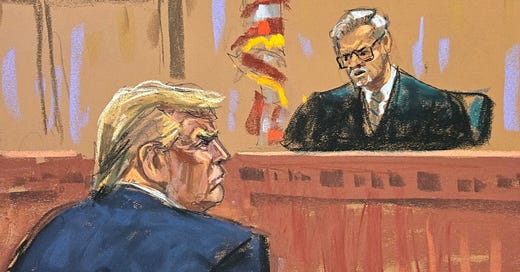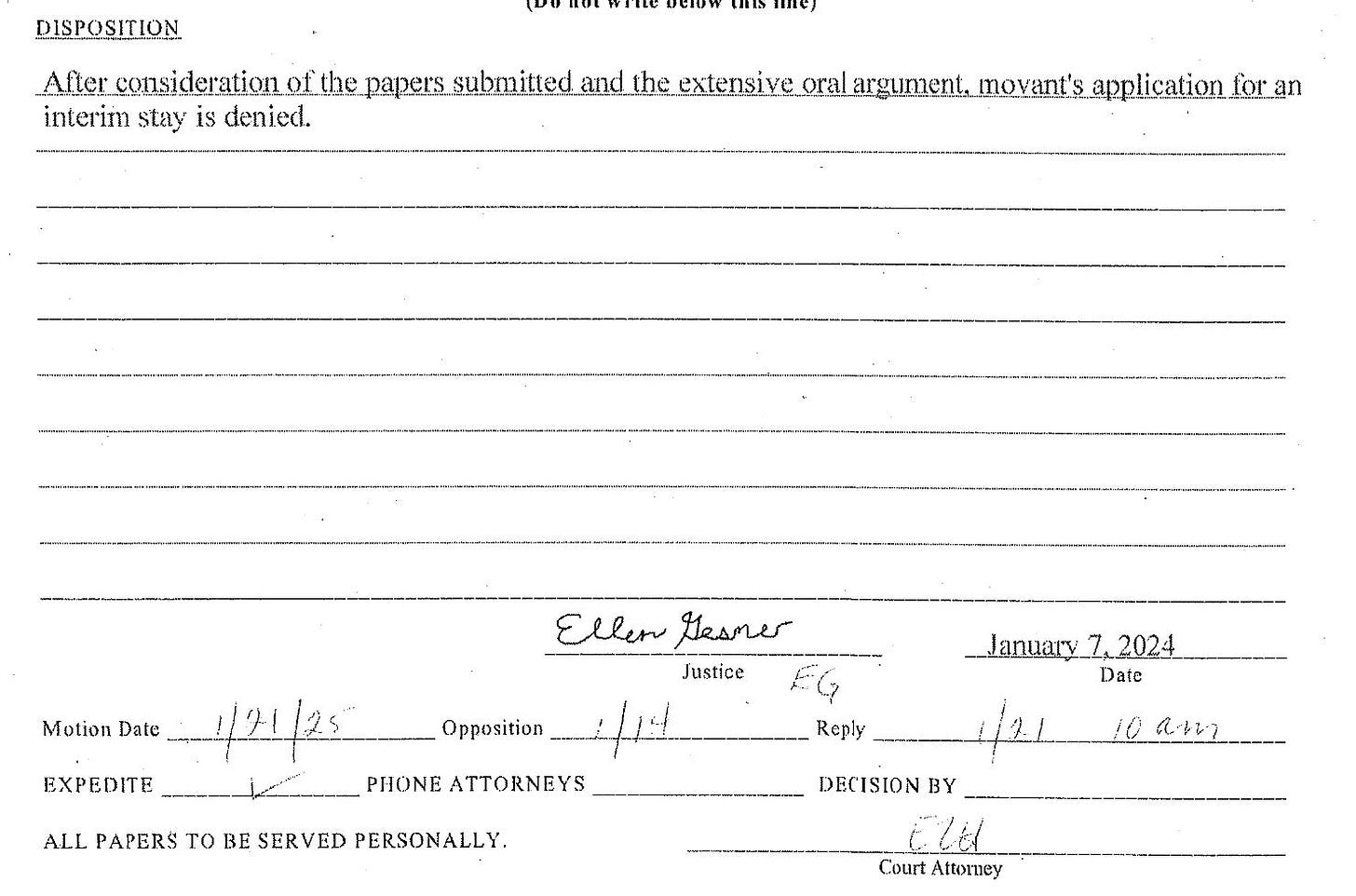Securing History's Verdict
The urgency of defeating Trump’s efforts to cancel his sentencing
The once-immense landscape of Donald Trump’s potential criminal liability has been reduced to a small patch of turf defined by whether his conviction on 34 felony counts will stand. Trump is now engaged in an all-out campaign to sweep it away by avoiding the sentencing scheduled for this Friday, January 10. Earlier today, he lost round one when the appellate division of the New York State courts refused, after a brief hearing, to grant his motion for an emergency stay.
The stakes of this skirmish, which will be fought in multiple courts over the next 2 1/2 days, are enormous. Through a wildly improbable series of legal and political twists that historians will analyze for decades, Trump now stands at the threshold of erasing a long series of crimes from the record books. The New York state convictions are all that remain, and if he can delay sentencing until he assumes office, he can claim that the law never truly touched him.
But first, he needs to wriggle out from under Merchan’s sentencing order and break Friday’s date. Merchan’s order followed his decision rejecting Trump’s arguments for reversal of the verdict based on the Supreme Court’s immunity opinion in Trump v. United States. Merchan also denied Trump’s claim that the Constitution requires an immediate shutdown of the case because he is about to become President.
The appellate division was Trump’s first attempt. Next, he will likely appeal to the New York Court of Appeals, the state’s highest court, and possibly to the U.S. Supreme Court, which has showered him with its kindness in the past. And he also may try to open a separate exclusively federal channel focused on the Second Circuit Court of Appeals.
Even as he ordered Trump to appear for sentencing on Friday, Merchan strongly signaled that he would impose no criminal penalty and instead grant the former President an unconditional discharge under New York law—no jail, no fine, no collateral consequences whatsoever.
Many Trump antagonists grumbled that Merchan decided to impose less than a slap on the wrist, and that Trump managed to slip the noose one last time. But given the state of play, his decision was adroit, even Solomonic.
It was a foregone conclusion that Trump would face no jail time for the convictions, and any actual penalty—including probation, which carries significant restrictions on liberty—would almost certainly have been set aside once Trump began his presidential term based on the doctrine that a sitting president can’t be prosecuted.
What remained, and still remains, is the raw fact of conviction, the all-important scarlet letter marking Trump as the nation’s only felon president. Here, Merchan was at his most trenchant. He explained why Trump’s effort to clear the slate would undermine the rule of law and signal that the law favors the powerful. He bolstered this last point by noting Trump’s record of savage and unsupported attacks on the prosecution and its key players.
We can expect more of a stern lecture from Merchan to Trump on Friday if the sentencing proceeds. Trump can bear it with clenched teeth and emerge free from the specter of criminal liability for the first time since March 2023, when the New York indictment was returned.
But that doesn’t satisfy the former President. Almost immediately after Merchan’s ruling, Trump let loose with a series of fire-breathing social media rants, including an apocalyptic claim that if the ruling were allowed to stand, it “would be the end of the Presidency as we know it.”
On Monday, he asked Merchan to indefinitely stay the hearing while he pursued appellate remedies. Merchan refused in a brief, two-page order. That set the stage for Trump’s run at the appellate courts, which hit its first roadblock this morning in New York’s appellate court, which turned him down with a curt “motion denied” on a form document.
The parties, including Justice Merchan, are keenly aware that everything changes in less than two weeks when Trump becomes President. At that point, any stage of any criminal proceeding would likely come to a screeching halt. That makes the calendar the dominant factor of the week.
For Trump, it’s a beat-the-clock battle where victory is defined not by reversing Merchan’s opinion—there’s not nearly enough time for that before the inauguration—but by halting Friday’s sentencing hearing.
That paramount goal is at once easier and harder than an outright reversal of Merchan’s holdings.
It is easier because Trump only has to get a higher court to find enough merit in his legal claims to justify delaying the sentencing while they conduct a full review. Trump’s legal arguments, characteristically, are weak, novel, or both. Yet he doesn’t need to win; he just needs to persuade a court to stay the sentencing.
It is harder, however, because of the legal requirements to secure a stay. Trump has to establish that 1) he is likely to prevail on the merits, 2) the balance of equities favors him, and 3) if the court doesn’t take the case, he will suffer irreparable injury. Ordinarily, the legal system’s response would be to go forward with the sentencing, after which the convict could bring all appellate claims. For that reason, there would be no irreparable injury, and the stay would be denied.
Trump offers two arguments in support of his perennial demand for special treatment.
The first is that, as President-elect, he should have the benefit of the legal doctrine, anchored in a memorandum from the Department of Justice Office of Legal Counsel, that sitting presidents can’t be prosecuted. This argument fails because the principle extends only to presidents during their terms. We only have one President at a time, and until January 20 at noon, that is Joe Biden.
The second argument is that claims of immunity are entitled to immediate “interlocutory” appeals. The problem here is Trump’s claim of immunity is poor because the conduct for which he was convicted—paying hush money and falsifying business records—was entirely unofficial.
Moreover, the Supreme Court has explained that the purpose of immediate appeal is to save potentially immune officials from extended proceedings that interfere with their duties. A brief sentencing before Trump assumes office doesn’t fit that bill.
Trump also tries a nuanced version of that argument based on the Supreme Court’s holding that the immunity doctrine prevents even the introduction of evidence of immune conduct, which Trump said happened at his trial. But even if that evidentiary claim were well taken, it wouldn’t justify a stay today. Any harm to immunity principles is already done.
So Trump’s frantic effort should fail. It’s the combination of chaotic circumstances and the fact that courts sometimes reason loosely about stays that gives him hope.
But patriots and partisans of the rule of law must hope for the opposite result. Beyond galling, Trump’s reelection is a deep wound to constitutional rule, and his effort to rewrite the history of his criminal conduct is an assault on truth, the cornerstone of free thought in a democratic society. Even as Trump ascends to an office he legitimately won, it has to be our ongoing fight to secure the verdict of history, so that constitutional rule might survive his tenure sufficiently intact to fully rebuild.






I disagree that Trump legitimately won. He won in contravention of the 14th Amendment and only through the hijinks of an ethically challenged Supreme Court. Sorry, but I reject the whitewashing of Trump, who had people done their jobs would be on his way to jail.
He’s far too busy in the war room plotting takeovers of allies territory to show up for a hearing Friday. All his harping about Liz Cheney being a war monger was simply
More projection. He is and forever will be a convicted felon.